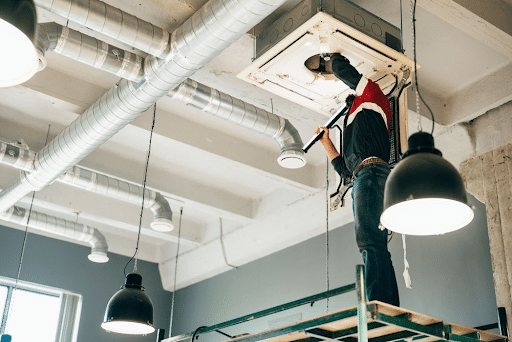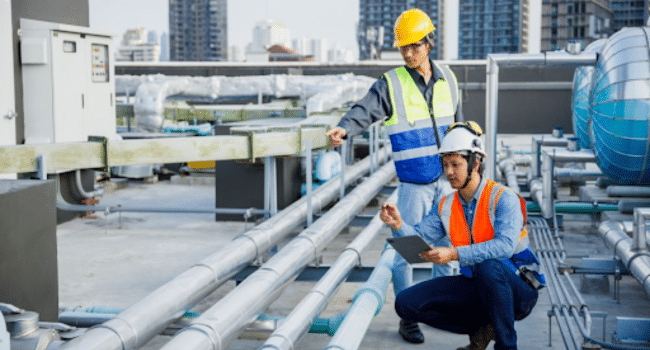Table of Contents
Commercial buildings rely on heating, ventilation, and air conditioning (HVAC) systems to keep indoor spaces safe and comfortable. From cooling large office floors in summer to ensuring proper airflow in warehouses, these systems can affect how smoothly a business runs. Yet, many people only think about them when something breaks down.
Understanding how commercial HVAC services work can help avoid costly problems and keep your building running efficiently. In addition to installing a new unit, it also involves regular inspections, preventive maintenance, and timely repairs that extend the life of your equipment.
So, how do these services work, and what should you expect at each stage? Here’s everything you need to know before you get started:
Choosing the Right HVAC Contractors
The first step is selecting qualified professionals to handle your system. Some contractors may not have experience with large office spaces, so finding one with proven knowledge in commercial HVAC is essential.
A reliable technician, such as ACwest Electrical, should be licensed, insured, and transparent about their services. Checking reviews, certifications, and references can also help you make the right choice.
When you work with the right team, you gain technical expertise and guidance on the best solutions for your building needs. This helps reduce errors during installation and ensures smoother performance in the long run.
Planning and Assessing Building Needs
Once you have chosen a technician, the next step is a detailed assessment of your building. Every space has different heating and cooling demands, depending on its size, layout, insulation, and usage. For example, a warehouse storing temperature-sensitive goods will need a different setup than a multi-story office.
This stage involves calculating load requirements, identifying energy concerns, and evaluating ventilation needs. Proper planning ensures that the system chosen will not be underpowered or oversized. Both extremes can lead to higher energy bills and unnecessary strain on equipment.
Installing the HVAC System Properly
Installation is a critical stage where precision matters. During this process, HVAC technicians place and connect the equipment according to manufacturer guidelines and building codes. This includes setting up ductwork, electrical wiring, and refrigerant lines. A poor installation can create ongoing issues, so having skilled professionals ensures everything is fitted correctly.
It’s also crucial to minimize disruptions to your business during this stage. Experienced contractors often coordinate work to avoid downtime. This will keep your operations running smoothly while the new system is in place.
Carrying Out Preventive Maintenance
Once the system is in use, preventive maintenance becomes essential. Regular HVAC inspections help detect issues before they turn into expensive repairs. These visits often include cleaning coils, replacing filters, checking ductwork, and inspecting electrical components.
Sticking to a maintenance schedule helps keep energy bills under control and prevents sudden malfunctions. It also provides peace of mind, knowing that your system is less likely to fail during extreme weather when you need it most.
Testing and Calibrating the Equipment
After installation, the system is tested and calibrated. This step ensures that all components are working together as expected. Technicians measure airflow, check refrigerant levels, and fine-tune the thermostat controls. They may also run performance tests to confirm that the HVAC equipment is heating or cooling efficiently.
In addition to comfort, calibration also affects energy efficiency and equipment lifespan. A system that’s not adjusted correctly may overwork itself, leading to breakdowns and higher utility costs. Proper testing provides a strong foundation for reliable performance.
Handling HVAC Repairs and Replacements

Even with regular care, parts can wear out or fail over time. When that happens, timely repairs are crucial. Ignoring minor issues can lead to bigger, costlier problems later. For instance, an unchecked refrigerant leak can damage the compressor, which is far more expensive to replace.
Sometimes, repair isn’t enough, and replacement becomes the better option. Service providers can help you decide when to replace a component to avoid repeated breakdowns. Acting quickly ensures your building remains comfortable and safe.
Upgrading for Energy Efficiency
Over the years, HVAC technology has advanced to provide better energy savings. Upgrades such as smart thermostats, variable-speed motors, and high-efficiency filters can improve performance and reduce operating costs. Older systems often consume more energy, so upgrading key parts can make a noticeable difference.
Beyond lowering bills, investing in efficiency supports sustainability goals and can improve indoor air quality within your building. Many businesses view upgrades as a long-term investment in comfort and cost savings.
Responding to Emergency Situations
Emergencies can happen regardless of how well you plan. Extreme heat waves, sudden breakdowns, or power outages may require immediate attention. A reliable HVAC contractor should offer emergency services to handle these urgent situations.
Quick response times help prevent productivity loss and protect valuable equipment or products that depend on stable temperatures. A service contract with an emergency clause ensures help is available whenever needed.
Monitoring and Supporting the System
In addition to routine maintenance, ongoing monitoring provides valuable insights into system performance. Some HVAC services offer remote monitoring tools that track efficiency, detect irregularities, and alert you to potential issues. This approach helps identify problems early before they disrupt daily operations.
Support also includes keeping records of past services and repairs. This history makes it easier to plan upgrades, predict future needs, and manage costs effectively. Continuous support ensures your heating system remains reliable year after year.
Conclusion
Choosing the right commercial HVAC services is a strategic investment. A reliable partner guides you through every stage, from planning and installation to maintenance and repairs. This proactive approach extends equipment life, controls energy costs, and ensures a comfortable environment. For any commercial building, investing in proper HVAC services is a practical step toward reliability, efficiency, and peace of mind.
